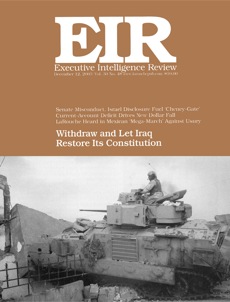U.S. Withdrawal Will Let Iraq Revive Its Own Constitution
by Muriel Mirak-Weissbach
Lyndon LaRouche called for the restoration of Iraq’s own Constitution, “forged in struggle against oppression, and in the search for unity of common interest among the communities of which that fighting nation was composed.” It is the Constitution of 1958, establishing the republic, which corresponds to LaRouche’s characterization. This document was the result of what LaRouche described as Iraq’s “popular struggle against repeated British imperial occupation,” and contained “an affirmation of universal principles of natural law.”
‘No, No to All the Chalabis’
by Scott Thompson
Economics
U.S. Current Account Deficit Drives New Dollar Fall
by Richard Freeman
The mechanism that has been financing the enormous current account deficit and propping up the dollar—luring or compelling foreign investors to bring large amounts of foreign capital into the United States—has begun to fail.
LaRouche’s Voice Heard in Mexican ‘Mega-March’ Against Usury
by Gretchen Small and Rubén Cota Meza
Mexican nationalists are on the move, and the role LaRouche is playing has Wall Street and its local lackeys terrified.
LaRouche Backs Mexico Against Bankers’ Fascism
by Lyndon H. LaRouche, Jr.
Russia Moves Towards Reclaiming Its Natural Resources Wealth
by Rachel Douglas
Business Briefs
Science & Technology
Fusion Energy Project Moves One Step Closer
The United States has rejoined the International Thermonuclear Experimental Reactor (ITER) project, the world’s main hope for fusion energy’s vast resources and potentials.
Feature
The Purloined Life of Edgar Allan Poe
by Jeffrey Steinberg
A lecture by Jeffrey Steinberg to members of the LaRouche Youth Movement. “My hypothesis is that Poe was one of the leading American republican counterintelligence officers, and that he was working for the Cincinnatus Society military intelligence circles. He was sent to Europe in the early 1830s as part of a trans-Atlantic campaign by the Society to make republican revolutions in France and Poland, and elsewhere, if possible. And his ‘literary career’ here in the United States was dominated by the kind of intelligence warfare, cultural warfare, that was an absolutely crucial part of the fight for the survival of the United States, and the spread of the American System around the world.”
Interviews
Hon. Giovanni Galloni
A leading figure in Italy’s Christian Democratic party throughout the post-war period, Mr. Galloni served in many government posts, and was a close collaborator of Aldo Moro, the former prime minister who was assassinated by the Red Brigades in 1978.
Departments
Editorial
How To Get Out of Iraq.
International
In Geneva, ME Peace Put on International Agenda
by Dean Andromidas
The Geneva Accord for Middle East peace, signed on Dec. 1 by world dignitaries, promises to become a Palestinian-Israeli effort backed by the international community, to outflank the policies of Israeli Prime Minister Ariel Sharon and Vice Dick President Cheney’s neo-conservative faction in Washington.
World Leaders Declare Support
Main Points of Geneva Accord
Five Eurasian Powers Study Korea Silk Road
by Kathy Wolfe
Rather than risk the breakdown of talks over Korea due to U.S. opposition, Eurasian negotiators are considering their own deals—and they’re listening to LaRouche.
Amelia Boynton Robinson: Civil Rights Leader Uplifts Europe’s Youth
by Ortrun Cramer
A Tale of George Soros and the Dutch Royals
by Rick Sanders
‘The Theory of Preventive Wars Has Always Been Groundless’
An interview with Hon. Giovanni Galloni.
Red Brigaders Arrested
by Claudio Celani
International Intelligence
National
Senate Misconduct, Israel Disclosure Fuel ‘Cheney-Gate’
by Jeffrey Steinberg and Edward Spannaus
Lyndon LaRouche has called for Senate Majority Leader Bill Frist to resign, because of his role in shutting down the Intelligence Committee, and his staffer’s involvement in leaking stolen Judiciary Committee documents.
LaRouche Youth Report Campaign Getting Hot
by Matthew Ogden
On the primary election drive in Washington, D.C.
Campaign 2004: Where They Stand: Cheney’s Strategic Policies and Iraq War
The first in a series: Ten Democratic Presidential candidates compared.
Imperial Occupation Can Never Bring Peace
by Michele Steinberg
A conference at The Palestine Center in Washington takes up the issue of “Christian Zionism.”
Book Reviews
A Boomer’s Guide to JFK
by Nina Ogden
The Kennedys, America’s Emerald Kings: A Five-Generation History of the Ultimate Irish Catholic Family, by Thomas Maier.
National News



